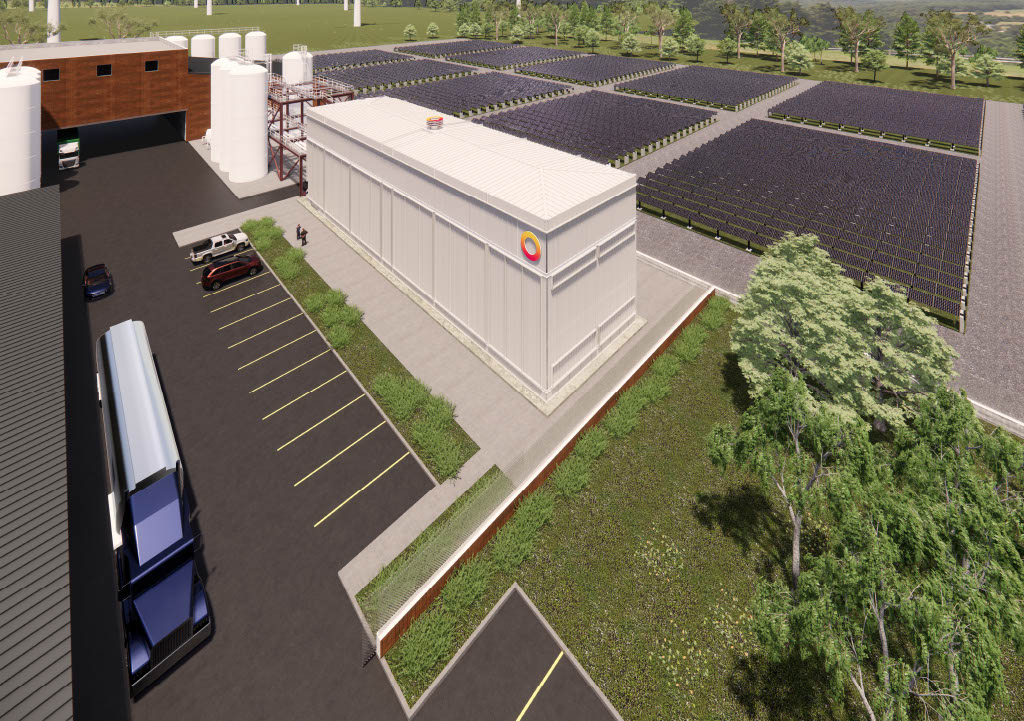From pv magazine USA
California’s Rondo Energy has released two versions of its Rondo Heat Battery (RHB), an energy storage system that dispatches heat and electricity for industrial applications. It is made of readily available materials such as bricks and iron.
The Bill Gates-backed company developed the battery as a way to decarbonize the industrial sector, which faces a range of challenges, including the need for large amounts of highly dispatchable power. The RHB systems can store more than 1 MWh per square meter, a high level of density that preserves area use at industrial facilities.
RHB batteries offer continuous power with a 95% annual capacity power while operating on input power as low as 15% capacity factor, or four hours of dispatchable power generation per day. The company’s so-called “brick toaster” heat battery stores intermittent generation from renewable energy resources like solar and wind, able to hold stored heat energy at temperatures up to 1,500 C for hours or days at a time. The zero-carbon solution supports manufacturing processes such as steel, cement and chemical manufacturing, as well as low-temperature food processing.
Rondo Energy said a single RHB300 unit could eliminate more than 40,000 tons of carbon emissions per year – equivalent to the carbon offset created by about 8,700 electric vehicles.
“The Rondo Heat Battery will help companies in industries such as cement, fuels, food and water desalination to begin leveraging the falling costs of renewables without modifying their facilities,” said Carmichael Roberts, the head of Breakthrough Energy Ventures’ investment committee.
RHBs use brick materials that have been used in the steel production process for over a century, but rearranged in a patented configuration. It can be used to replace fuel-fired furnaces and boilers, offering low-cost zero-carbon energy. The company said the units are fully automatic, able to deliver heat on demand for 24 hours a day at constant temperatures.
Rondo Energy said the batteries can be integrated into existing process heating equipment, allowing for significant emissions reductions without the need for a factory overhaul. The batteries are expected to operate for 40 years or more with no performance degradation.
“Rondo’s mission is simple: lower cost heat and energy for large industrial processes. We’re finding that deep emission reductions are now both practical and affordable for many of the world’s most energy-intensive facilities,” said Jeremey Keller, senior vice president of Rondo Energy. “Our studies of customer facilities are showing 50% to 90% reductions in emissions and reductions in operating costs of 30% or more.”
California-based Rondo Energy has raised $25.1 million in funding to date from Breakthrough and Energy Impact Partners. It concluded a Series A funding round in February.
This content is protected by copyright and may not be reused. If you want to cooperate with us and would like to reuse some of our content, please contact: editors@pv-magazine.com.




2 comments
By submitting this form you agree to pv magazine using your data for the purposes of publishing your comment.
Your personal data will only be disclosed or otherwise transmitted to third parties for the purposes of spam filtering or if this is necessary for technical maintenance of the website. Any other transfer to third parties will not take place unless this is justified on the basis of applicable data protection regulations or if pv magazine is legally obliged to do so.
You may revoke this consent at any time with effect for the future, in which case your personal data will be deleted immediately. Otherwise, your data will be deleted if pv magazine has processed your request or the purpose of data storage is fulfilled.
Further information on data privacy can be found in our Data Protection Policy.